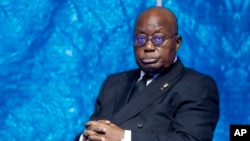Ghana’s president, Nana Akufo-Addo, and his ministers reduced their wages by 30 percent amid a raft of other measures to cut expenditures in the wake of rising fuel prices caused mainly by the Ukraine crisis.
In a much anticipated address to the nation, Finance Minister Ken Ofori-Atta said the government hoped to save around $400 million through measures, which include the immediate suspension of foreign travel by government appointees, except for critical missions, and the purchase of imported vehicles.
He said the government has no option but to respond to developments on the global market to save the economy.
"It is important to stress, right from the onset, that the difficulties we are facing in Ghana are not peculiar to Ghana. Governments in both developed and developing countries are busily coming out with various prescriptions to bring their economies back on track, after the devastating impact of COVID-19 which distorted global supply chains, and the ongoing Russia-Ukraine war."
In response, the opposition led by Minority Leader Haruna Iddrisu told the media at a press conference that the president’s measures are populist and inadequate to cushion Ghanaians from hardship.
“He is lost touch with reality," Iddrisu said. "He’s not in tune with the state of the Ghanaian economy. Our economy today is one that reflects nothing less than a cost-of-living crisis and a cost of doing business crisis, both for citizens and for businesses who are unable to cope with the measures so announced by the minister for finance. We do not find his proposed measures adequate enough.”
For his part, economist Patrick Asuming told VOA News that cutting expenses is a good move, but it is insignificant to achieve any long-term impact on the economy.
“I believe in medium to long term solutions," he said. "I think we’re in crisis and we need to fight the fire. But beyond stabilizing the currency over the next few months or the rest of the year, some things will have to give. Also, it’s not enough to say ‘I’m going to do all these cuts to government sector workers and political appointees till the rest of the year.’ I think we need more substantial reforms.”
In the weeks or months ahead, Ghanaians will be looking to see how the measures will affect the economy and also ease the high cost of living.




